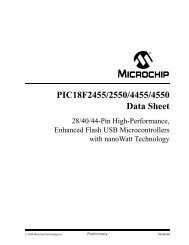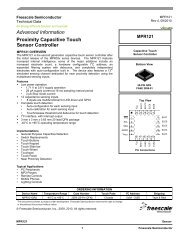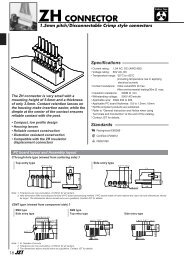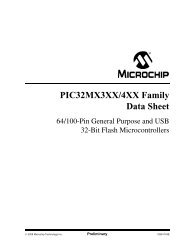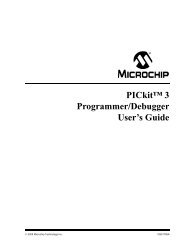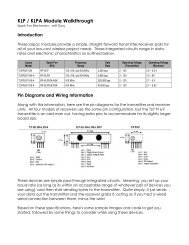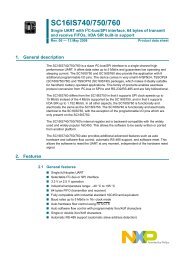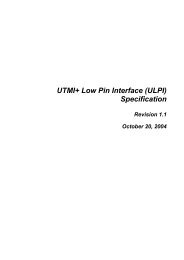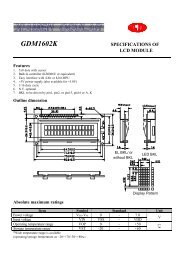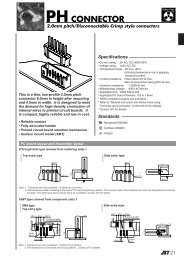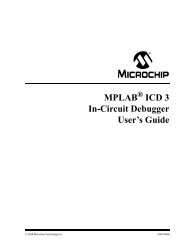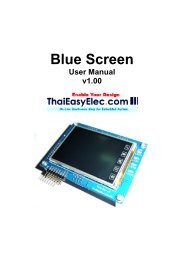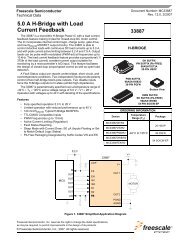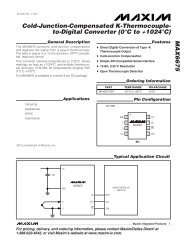PIC24HJ64 Datasheet
PIC24HJ64 Datasheet
PIC24HJ64 Datasheet
Create successful ePaper yourself
Turn your PDF publications into a flip-book with our unique Google optimized e-Paper software.
PIC24HJ32GP302/304, <strong>PIC24HJ64</strong>GPX02/X04, AND PIC24HJ128GPX02/X04<br />
26.2 MPASM Assembler<br />
The MPASM Assembler is a full-featured, universal<br />
macro assembler for all PIC MCUs.<br />
The MPASM Assembler generates relocatable object<br />
files for the MPLINK Object Linker, Intel ® standard HEX<br />
files, MAP files to detail memory usage and symbol<br />
reference, absolute LST files that contain source lines<br />
and generated machine code and COFF files for<br />
debugging.<br />
The MPASM Assembler features include:<br />
• Integration into MPLAB IDE projects<br />
• User-defined macros to streamline<br />
assembly code<br />
• Conditional assembly for multi-purpose<br />
source files<br />
• Directives that allow complete control over the<br />
assembly process<br />
26.3 MPLAB C18 and MPLAB C30<br />
C Compilers<br />
The MPLAB C18 and MPLAB C30 Code Development<br />
Systems are complete ANSI C compilers for<br />
Microchip’s PIC18 and PIC24 families of microcontrollers<br />
and the dsPIC30 and dsPIC33 family of digital signal<br />
controllers. These compilers provide powerful<br />
integration capabilities, superior code optimization and<br />
ease of use not found with other compilers.<br />
For easy source level debugging, the compilers provide<br />
symbol information that is optimized to the MPLAB IDE<br />
debugger.<br />
26.4 MPLINK Object Linker/<br />
MPLIB Object Librarian<br />
The MPLINK Object Linker combines relocatable<br />
objects created by the MPASM Assembler and the<br />
MPLAB C18 C Compiler. It can link relocatable objects<br />
from precompiled libraries, using directives from a<br />
linker script.<br />
The MPLIB Object Librarian manages the creation and<br />
modification of library files of precompiled code. When<br />
a routine from a library is called from a source file, only<br />
the modules that contain that routine will be linked in<br />
with the application. This allows large libraries to be<br />
used efficiently in many different applications.<br />
The object linker/library features include:<br />
• Efficient linking of single libraries instead of many<br />
smaller files<br />
• Enhanced code maintainability by grouping<br />
related modules together<br />
• Flexible creation of libraries with easy module<br />
listing, replacement, deletion and extraction<br />
26.5 MPLAB ASM30 Assembler, Linker<br />
and Librarian<br />
MPLAB ASM30 Assembler produces relocatable<br />
machine code from symbolic assembly language for<br />
dsPIC30F devices. MPLAB C30 C Compiler uses the<br />
assembler to produce its object file. The assembler<br />
generates relocatable object files that can then be<br />
archived or linked with other relocatable object files and<br />
archives to create an executable file. Notable features<br />
of the assembler include:<br />
• Support for the entire dsPIC30F instruction set<br />
• Support for fixed-point and floating-point data<br />
• Command line interface<br />
• Rich directive set<br />
• Flexible macro language<br />
• MPLAB IDE compatibility<br />
26.6 MPLAB SIM Software Simulator<br />
The MPLAB SIM Software Simulator allows code<br />
development in a PC-hosted environment by simulating<br />
the PIC MCUs and dsPIC ® DSCs on an instruction<br />
level. On any given instruction, the data areas can be<br />
examined or modified and stimuli can be applied from<br />
a comprehensive stimulus controller. Registers can be<br />
logged to files for further run-time analysis. The trace<br />
buffer and logic analyzer display extend the power of<br />
the simulator to record and track program execution,<br />
actions on I/O, most peripherals and internal registers.<br />
The MPLAB SIM Software Simulator fully supports<br />
symbolic debugging using the MPLAB C18 and<br />
MPLAB C30 C Compilers, and the MPASM and<br />
MPLAB ASM30 Assemblers. The software simulator<br />
offers the flexibility to develop and debug code outside<br />
of the hardware laboratory environment, making it an<br />
excellent, economical software development tool.<br />
DS70293B-page 272 Preliminary © 2008 Microchip Technology Inc.



